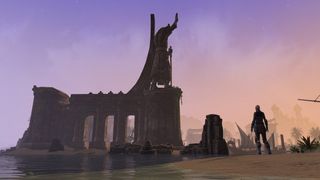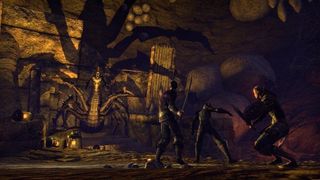
Everything on the previous page has me pretty excited for Elder Scrolls Online, especially considering my level of indifference about it going in. But like a good skooma trip, the time always rolls around when you have to come down and face reality. ESO probably isn't going to be the mythical "WoW killer," nor the multiplayer game every Elder Scrolls fan has been asking for.
What I didn't like
- The combat isn't quite there yet. Yes, I both loved and didn't love ESO's combat; it's one of the most important things for the game to get right. ESO has all the trappings of Skyrim's combat, but it lacks its immediacy and kinetic physicality. You feel more like you're swinging at or through opponents than actually connecting. Blocking and bashing, as well, are based on visual prompts, turning combat into more of a "hit the right buttons at the right time" exercise than Skyrim or Oblivion's gritty "keep your guard up and look for an opening."
I am willing to wait and see on this. There's still time for improvements before launch that wouldn't require a gutting of the entire system. And it's not terrible as it is: It feels about the same as Guild Wars 2, falling a bit short of Tera—the latter being the gold standard for MMO action combat, in my opinion.
- Classes seem like an afterthought, and don't cover enough niches. ESO has classes. But it doesn't need them, and I don't really understand why they're there. Only four will launch with the game: Dragonknight, Sorcerer, Templar, and Nightblade. Those basically boil down to samurai, mage, paladin, and rogue. The thing is, you can already build more or less any of those character types using the universal skill lines that are independent of your class. Variety is nice, but I would have preferred the addition of more universal skill lines than these four, tacked-on, oddly-specific archetypes.
A lot of concepts are left out in the cold, since you can't just choose not to take a class. If I want want my build to be something like a Nord berserker, I can forge something along those lines with non-class skill lines. But I have to pick a class that doesn't fit my concept on top of that, leaving me with skill trees that will just sit, forever ignored, on my character sheet. I expect we'll see more classes added over time, but right now, they seem too narrow and almost vestigial.

- The dungeon layouts draw from MMOs more than they do from Elder Scrolls games. The design of MMO dungeons—the ones scattered in the world, moreso than instanced content—is absolutely boring. I want to get lost in ESO's world, but in the game's cavernous, straightforward, open-layout dungeons, it would be hard for even a blind Moth Priest to get lost. Sure, the Dwemer ruins look nice. But they lack the sense of mystery, and the feeling of delving into the unknown, claustrophobic bowels of the earth that are such a hallmark of Elder Scrolls games. I want to pass through the threshold of a dungeon with the knowledge that I'll be plumbing its depths for hours, the sight of the sun becoming a fading dream as corridor after corridor of steam pipes and hostile constructs assault my hit points and my sanity.
If I had to pick one most obvious disconnect between the traditional Elder Scrolls games and Elder Scrolls Online, it's the dungeons. You can't make up for it with instanced group content, because it's impossible to have the same paranoia-filled, self-paced experiences in such areas. It's a key part of the Elder Scrolls experience, so this is a big problem.
- It's zone-based. I don't think even the most optimistic people failed to see this coming, but it's still something that makes ESO feel more like an MMO than a genuine TES game. The world of Tamriel, expansive and open as it is, is divided up into level-based zones that make it difficult to explore as freely as you would in Oblivion or Skyrim. I didn't actually have the opportunity to go venturing off into the distance, as I had a limited amount of time in a build where portions of the world aren't even there yet. But there are separate zones designed for certain levels of characters.
The quest structure in the portions I played mostly led me by the hand from hub to hub, and I felt I was being whisked past experiences like getting lost and spontaneously adventuring into a cavern or a fort, as you do so frequently in other Elder Scrolls games. There is plenty to find off the beaten path, but the zone flow makes it feel like Zenimax doesn't care whether you find it or not. I also worry that partitions and loading screens will kill the sense of a seamless, immersive world, but I can't confirm how frequently these will appear.
All things considered, there are more reasons to be excited for Elder Scrolls Online than I expected to find, which was refreshing and encouraging. I could foresee it becoming a strong, second-tier contender in a league with Rift and EVE, based on the number of things it does right. Unfortunately, it seems to be cutting just enough key corners with the Daedric Knife of MMO Design Philosophy to fall short of the sublime, multiplayer Elder Scrolls experience we've all been dreaming of.
If you're anxious to see it for yourself, you can sign up for a chance at the closed beta on the ESO site. It'll also be playable at PAX East this weekend.
Comic deals, prizes and latest news
Sign up to get the best content of the week, and great gaming deals, as picked by the editors.

The Elder Scrolls Online dev says the 'metaverse' is sinking because it ignored 20 years of games doing the exact same thing: 'It's not new, and they should stop treating it like it's new'

The Elder Scrolls Online has made nearly $2 billion in its lifetime, 9 years after the big comeback that doubled its player count overnight
Most Popular






